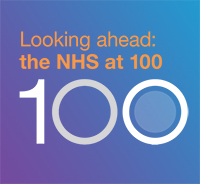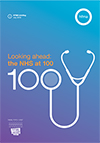Comment / Changing the balance of responsibility
 To mark the 70th birthday of the NHS, the HFMA invited a number of commentators to look ahead to what the NHS might look like in 30 years’ time, examining both the obstacles it will face and the opportunities to enhance health and healthcare. Here, Sanjay Agrawal, discusses how changing lifestyles are likely to impact on the health service. And he explores the different roles that need to be played by the state and the individual in improving public health.
To mark the 70th birthday of the NHS, the HFMA invited a number of commentators to look ahead to what the NHS might look like in 30 years’ time, examining both the obstacles it will face and the opportunities to enhance health and healthcare. Here, Sanjay Agrawal, discusses how changing lifestyles are likely to impact on the health service. And he explores the different roles that need to be played by the state and the individual in improving public health.
Imagining the NHS and the role of the citizen in 2048 allows the mind to conjure up all sorts of Blade runner like scenarios. However, in the absence of catastrophic global environmental disaster or nuclear war, the reality is that there will be an evolution rather than revolution in how people look after themselves.
With planning for public health in the future, it’s worth looking back in time. And since the inception of the NHS in 1948, the trends are clear. People are living longer and spend more time being frail in old age. On a worldwide scale, global warming and wars are leading to displaced populations and poverty, which lead to adverse health impacts. And severe global outbreaks of infections are occurring periodically with antibiotic resistance becoming worse.Adding to these trends is the observation that humans are less physically active and are consuming more calories than they ever have through human history. This has led to record levels of obesity all over the world, with the UK being near the top of that list. On the plus side – individuals, governments, science and technology are all looking to support changes in individual human behaviours. There are measures to counteract global warming, new agricultural techniques, foods fortified with nutrients and vitamins, and technology that allows people to monitor and adapt their own health behaviours. For example, growing numbers of people use watches that can feedback on activity levels, heart rate, blood pressure, glucose levels and sleep.
Legislation has also been used to improve public-health with measures such as reducing overcrowding of homes, tobacco control measures, raising standards of clean water and sanitation and eradicating diseases such as smallpox and polio. The development and administration of vaccinations have saved several millions of lives across the world from diseases that would have killed us 70 years ago.
So, what about 30 years from now? As individual citizens, we might have access to technologies that will revolutionise and make us want to be more responsible for our personal health. For instance, we may have the ability to undertake a detailed risk assessment examination of our DNA (genetic blueprint). We might then modify these risks through changing our diet, exercise, medicines, gene modification or vaccinations.
It is also possible that artificial intelligence could change our sense of ownership and approach to individual health status. Perhaps we will consult the medical profession much later in a disease process and instead use online technologies combined with artificial intelligence hardware to diagnose and identify treatment with medications or procedures.
Universally accessible virtual personal health coaches may be in our homes guiding our diet, exercise and health choices, reducing demand for healthcare.
The prohibitive rise in cost of healthcare in the UK associated with ageing populations, new technology, costly medicines and public expectation is likely to be one of the drivers for greater emphasis on prevention or self-management of disease. The role of governments will be to facilitate this transition from perceived state responsibility for providing healthcare to individual responsibility for well-being. This will require legislation, new governance frameworks, financial or other incentives for individuals and populations and disincentives for healthcare providers and practitioners.
Alongside all this, there’s one thing we can say about the role of the healthcare finance professional in the UK in 2048. It’s probably going to get more complicated.
* Sanjay Agrawal is a consultant in respiratory and critical care medicine at the University Hospitals of Leicester NHS Trust and an HFMA trustee.

Looking ahead: the NHS at 100. To mark the 70th birthday of the NHS on 5 July 2018, the HFMA has carried out some long-term thinking about the factors that will impact on the financial future of health and social care over the next 30 years, taking it through to its 100th birthday in 2048.
NHS@100 blogs
Anita Charlesworth discusses why workforce holds the key to meeting the demographic challenge
Related content
The Institute’s annual costing conference provides the NHS with the latest developments and guidance in NHS costing.
The value masterclass shares examples of organisations and systems that have pursued a value-driven approach and the results they have achieved.